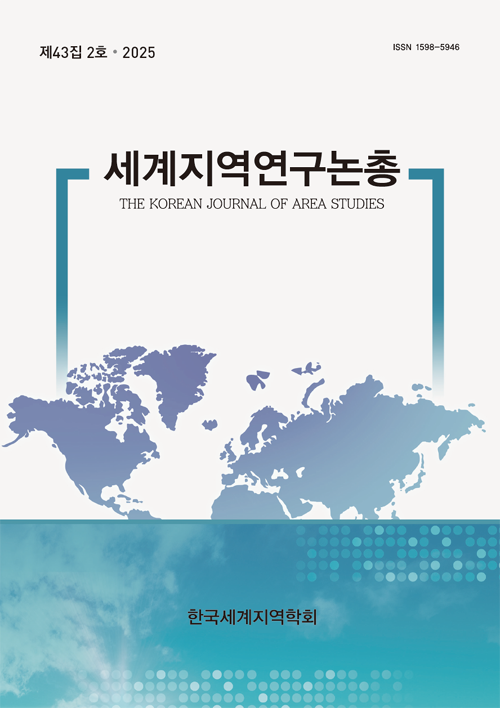- 영문명
- Institutional Transformations of the Global South: From Bandung to BRICS
- 발행기관
- 한국세계지역학회
- 저자명
- 이진영(Jinyoung Lee) 조영철(Young Chul Cho)
- 간행물 정보
- 『세계지역연구논총』제43집 제3호, 1~37쪽, 전체 37쪽
- 주제분류
- 사회과학 > 정치외교학
- 파일형태
- 발행일자
- 2025.09.30
7,240원
구매일시로부터 72시간 이내에 다운로드 가능합니다.
이 학술논문 정보는 (주)교보문고와 각 발행기관 사이에 저작물 이용 계약이 체결된 것으로, 교보문고를 통해 제공되고 있습니다.

국문 초록
본 연구는 1955년 반둥회의(Bandung Conference)가 서구 강대국 중심의 국제질서에 도전하며 탈식민 국제규범을 창출한 역사적 기점이었음을 전제로, 그 핵심 규범(반둥정신)이 비동맹운동(NAM), 77개국 그룹(G77), 브릭스 플러스(BRICS+), 남남협력 고위급회담 등 글로벌 사우스 협력체를 통해 어떻게 계승・변용되어 왔는지를 분석한다. 연구는 NAM 정상회의 최종 문서와 주요 글로벌 사우스 협력체의 공식 기록을 검토하여, 반둥정신의 내포(connotation) 변화와 외연(denotation) 확대 과정을 규명한다. 분석 결과, 첫째, 반둥정신의 핵심 원칙인 주권 존중, 내정 불간섭, 평등, 상호협력은 시대적 맥락에 따라 인권, 지속가능발전, 기후위기 대응 등 새로운 의제로 확장되었다. 둘째, NAM과 G77은 신식민주의적 국제경제질서에 대한 비판과 공정한 세계무역・남남협력 강화를 통해 규범적 도전자 역할을 수행했고, 브릭스는 신개발은행(NDB) 설립 등 실질적 대안 금융 메커니즘을 통해 제도화 수준을 심화시켰다. 셋째, 글로벌 사우스 협력체는 단일한 정치 블록이 아니라 상호 보완적 기능을 수행하는 네트워크형 다자주의로 발전하며, 서구 중심 질서에 대한 대안적 거버넌스를 모색하고 있다. 본 연구는 글로벌 사우스가 단순한 규범 수용자가 아닌 글로벌 노스와 함께 규범 창출자로서 국제질서 재편의 핵심 행위자임을 강조한다. 이러한 분석은 탈식민 국제질서 이론화와 대안적 글로벌 거버넌스 설계 논의에 기여한다.
영문 초록
This study begins from the premise that the 1955 Bandung Conference marked a historical turning point that challenged the Western great power–centered international order and inaugurated decolonial international norms. It analyzes how the core principles of the Bandung Spirit have been inherited and transformed through Global South institutions such as the Non-Aligned Movement (NAM), the Group of 77 (G77), BRICS+, and the High-Level Conferences on South-South Cooperation. By examining the final declarations of NAM summits alongside the official records of major Global South cooperation frameworks, the study traces both the semantic evolution (connotation) and the expansion of scope (denotation) of the Bandung Spirit.
The analysis reveals three main findings. First, the Bandung principles of sovereignty, non-interference, equality, and mutual cooperation have been progressively expanded to include new global agendas such as human rights, sustainable development, and climate crisis response. Second, NAM and the G77 have served as normative challengers to the neo-colonial international economic order by advocating for fairer global trade and strengthening South-South cooperation, while BRICS has deepened institutionalization through tangible mechanisms such as the establishment of the New Development Bank (NDB). Third, Global South organizations have developed not as a single political bloc but as a form of networked multilateralism with complementary functions, thereby seeking alternative forms of governance beyond the Western-centric order. This study underscores that the Global South is not merely a passive recipient of norms but an active co-creator of international norms alongside the Global North, positioning itself as a central actor in the restructuring of world order. Such an analysis contributes to theorizing decolonial world order and advancing discussions on alternative designs for global governance.
목차
Ⅰ. 들어가며
Ⅱ. 역사적 맥락: 탈식민 반둥정신과 글로벌 사우스
Ⅲ. NAM 정상회의 속의 탈식민 반둥정신의 진화와 변용
Ⅳ. 반둥정신의 외연 확대: 글로벌 사우스 중심의 협의체 분석
Ⅴ. 맺음말
참고문헌
해당간행물 수록 논문
참고문헌
교보eBook 첫 방문을 환영 합니다!

신규가입 혜택 지급이 완료 되었습니다.
바로 사용 가능한 교보e캐시 1,000원 (유효기간 7일)
지금 바로 교보eBook의 다양한 콘텐츠를 이용해 보세요!



